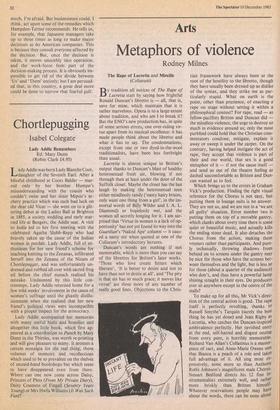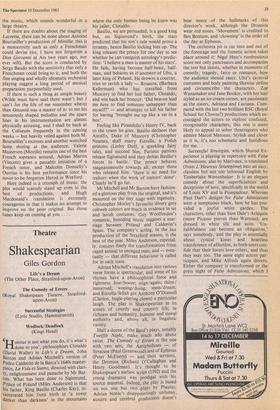Arts
Metaphors of violence
Rodney MiInes
By tradition all notices of The Rape of Lucretia start by saying how frightful Ronald Duncan's libretto is, — all, that is, save for mine, which maintain that it is rather marvelous. Opera is to a large extent about tradition, and who am I to break it? But the ENO's new production has, in spite of some serious errors, one over-riding vir- tue apart from its musical excellence: it has made people think about the libretto and what it has to say. The condemnations, except from one or two dyed-in-the-wool traditionalists, have been less forthright than usual.
Lucretia is almost unique in Britten's output thanks to Duncan's blast of healthy heterosexual fresh air, blowing if not through then at least under the door of the Suffolk closet. Maybe the closet has the last laugh by making the heterosexual men either mindlessly randy ('nasty hairy brutes, only want one thing from a girl', in the im- mortal words of Billy Wilder and I. A. L. Diamond) or hopelessly wet, and the women all secretly longing for it. I am sur- prised that 'Virtue in women is a lack of op- portunity' has not yet found its way into the Guardian's 'Naked Ape' column — it caus- ed a nasty stir when quoted at one of the Coliseum's introductory lectures.
Duncan's words are nothing if not memorable, which is more than you can say of the librettos for Britten's later works. 'Those who love create fetters which liberate', 'It is better to desire and not to have than not to desire at all', and 'The pity is that sin has so much grace; it moves like virtue' are three more of any number of really good lines. Objections to the Chris- tian framework have always been at the root of the hostility to the libretto, though they have usually been dressed up as dislike of the syntax, and they strike me as par- ticularly stupid. What on earth is the point, other than prurience, of enacting a rape on stage without setting it within a philosophical context? For rape, read — as fellow-pacifists Britten and Duncan did — the mindless violence, the urge to destroy so much in evidence around us; only the most purblind could hold that the Christian com- mentators condone, mitigate, explain it away or sweep it under the carpet. On the contrary, having helped instigate the act of rape, they accept that violence is part of their and our world, that sex is a good metaphor of it — if not the cause itself — and send us out of the theatre feeling as dashed uncomfortable as Britten and Dun- can wanted us to feel.
Which brings us to the errors in Graham Vick's production. Finding the right visual reference for the Chorus is not easy, but putting them in lounge suits is no answer. They are not us, and we are not in a 'we are, all guilty' situation. Error number two is putting them on top of a movable gantry, which clanks about every time there is some quiet or beautiful music, and actually kills the ending stone dead. It also detaches the Chorus from the action, making them voyeurs rather than participants. And pure- ly technically, throwing shadows from behind on to screens under the gantry may be nice for those who have the screens bet- ween themselves and the light, but is less so for those (about a quarter of the audience) who don't, and thus have a powerful lamp shining straight in their eyes. Do producers ever sit anywhere except in the centre of the stalls?
To make up for all this, Mr Vick's direc- tion of the central action is good. The rape itself is perfectly revolting, thanks to Russell Smythe's Tarquin (surely the best thing he has yet done) and Jean Rigby as Lucretia, who catches the Duncan-inspired ambivalence perfectly. Her ravished entry at the end, self-hatred and disgust oozing from every pore, is horribly memorable. Richard Van Allan's Collatinus is a master- piece of tact, and Anne-Marie Owens sees that Bianca is a peach of a role and takes full advantage of it. All 'sing most ex' pressively, none more so than AnthonY Rolfe Johnson's magnificent male Chorus. Steuart Bedford directs his 12 fine in" strumentalists extremely well, and rather more briskly than Britten himself. Whatever reservations people may have about the words, there can be none about
the music, which sounds wonderful in a large theatre.
If there are doubts about the staging of Lucretia, there can be none about Antoine Bourseiller's production of Mireille: this is a monstrosity such as only a Frenchman could devise (no, I have not forgotten a Don Giovanni at Aix two years ago, nor ever will). But the score is conducted by Serge Baudo with the sensitivity that only a Frenchman could bring to it, and both the fine singing and wholly idiomatic orchestral playing suggest a long period of musical preparation purposefully used.
If there is such a thing as simple beauty (Wilde must have said there wasn't but I can't for the life of me remember where) then Gounod was a master of it: to me his sensuously shaped melodies and the spare lines in his instrumentation are almost physically arousing, and I shall be back at the Coliseum frequently in the coming weeks — but heavily veiled against both M. Bourseiller's excesses and another wretched lamp shining at the audience. Valerie Masterson (Mireille) remains one of the best French sopranos around, Adrian Martin (Vincent) gives a passable imitation of a French tenor, and Malcolm Donnelly's Ourrias is his best performance since his never-to-be-forgotten Herod in Wexford.
Here indeed is a triumph of music: the plot would scarcely stand up even in the best of productions, and Hugh Macdonald's translation is extremely courageous in that it makes no attempt to improve on the poor original. But those tunes keep on coming at you ... .















































 Previous page
Previous page